A Benzimidazole-Based N-Heterocyclic Carbene Derivative Exhibits Potent Antiproliferative and Apoptotic Effects against Colorectal Cancer
Abstract
1. Introduction
2. Materials and Methods
2.1. Reagents
2.2. Cell Culture
2.3. IMBZC Synthesis and Preparation
2.4. MTT Cytotoxicity Assay
2.5. Scratch Wound-Healing Assay
2.6. Clonogenic Assay
2.7. Real-Time Reverse Transcription–Quantitative Polymerase Chain Reaction (RT-qPCR)
2.8. Western Blot Technology
2.9. Statistical Analysis
3. Results
3.1. IMBZC Compound Inhibits CRC Cell Viability in a Dose-Dependent Manner
3.2. IMBZC Compound Decreases CRC Cell Migration and Inhibits Colony Formation
3.3. IMBZC Downregulates the Expression Levels of Anti-Apoptotic Bcl-2 and Bcl-xL While Upregulating Pro-Apoptotic Bax and p53 in a Dose-Dependent Manner
3.4. IMBZC Enhances the Cytotoxic Effects of Conventional CRC Drugs 5-FU, IRI, and OXA
4. Discussion
5. Conclusions
Author Contributions
Funding
Institutional Review Board Statement
Informed Consent Statement
Data Availability Statement
Acknowledgments
Conflicts of Interest
Abbreviations
References
- Ahmad, R.; Singh, J.K.; Wunnava, A.; Al-Obeed, O.; Abdulla, M.; Srivastava, S.K. Emerging trends in colorectal cancer: Dysregulated signaling pathways. Int. J. Mol. 2021, 47, 14. [Google Scholar] [CrossRef] [PubMed]
- Xi, Y.; Xu, P. Global colorectal cancer burden in 2020 and projections to 2040. Transl. Oncol. 2021, 14, 101174. [Google Scholar] [CrossRef] [PubMed]
- Deo, S.V.S.; Sharma, J.; Kumar, S. GLOBOCAN 2020 report on global cancer burden: Challenges and opportunities for surgical oncologists. Ann. Surg. Oncol. 2022, 29, 6497–6500. [Google Scholar] [CrossRef] [PubMed]
- Islami, F.; Goding Sauer, A.; Miller, K.D.; Siegel, R.L.; Fedewa, S.A.; Jacobs, E.J.; McCullough, M.L.; Patel, A.V.; Ma, J.; Soerjomataram, I.; et al. Proportion and number of cancer cases and deaths attributable to potentially modifiable risk factors in the United States. CA Cancer J. Clin. 2018, 68, 31–54. [Google Scholar] [CrossRef]
- Edward, C.; Sartorelli, A.C. Cancer chemotherapy. Lange’s Basic Clin. Pharmacol. 2018, 948–976. [Google Scholar]
- Aldahhan, R.; Almohazey, D.; Khan, F.A. Emerging trends in the application of gold nanoformulations in colon cancer diagnosis and treatment. In Seminars in Cancer Biology; Academic Press: Cambridge, MA, USA, 2022; Volume 86, pp. 1056–1065. [Google Scholar]
- Branca, J.J.V.; Carrino, D.; Gulisano, M.; Ghelardini, C.; Di Cesare Mannelli, L.; Pacini, A. Oxaliplatin-induced neuropathy: Genetic and epigenetic profile to better understand how to ameliorate this side effect. Front. Mol. Biosci. 2021, 8, 643824. [Google Scholar] [CrossRef]
- Bukowski, K.; Kciuk, M.; Kontek, R. Mechanisms of multidrug resistance in cancer chemotherapy. Int. J. Mol. Sci. 2020, 21, 3233. [Google Scholar] [CrossRef]
- Liu, J.; Xing, X.N.; Huang, J.H.; Lu, L.Q.; Xiao, W.J. Light opens a new window for N-heterocyclic carbene catalysis. Chem. Sci. 2020, 11, 10605–10613. [Google Scholar] [CrossRef]
- Lenis-Rojas, O.A.; Cordeiro, S.; Horta-Meireles, M.; Fernández, J.A.A.; Fernández Vila, S.; Rubiolo, J.A.; Cabezas-Sainz, P.; Sanchez, L.; Fernandes, A.R.; Royo, B. N-heterocyclic carbene iron complexes as anticancer agents: In vitro and in vivo biological studies. Molecules 2021, 26, 5535. [Google Scholar] [CrossRef]
- Chen, J.; Huang, Y. N-Heterocyclic Carbenes as Brønsted Base Catalysts; Wiley-VCH: Weinheim, Germany, 2018. [Google Scholar]
- Barik, S.; Biju, A.T. N-Heterocyclic carbene (NHC) organocatalysis using aliphatic aldehydes. Chem. Commun. 2020, 56, 15484–15495. [Google Scholar] [CrossRef]
- Porchia, M.; Pellei, M.; Marinelli, M.; Tisato, F.; Del Bello, F.; Santini, C. New insights in Au-NHCs complexes as anticancer agents. Eur. J. Med. Chem. 2018, 146, 709–746. [Google Scholar] [CrossRef]
- Gürbüz, N.; Kaloğlu, N.; Kızrak, Ü.; Özdemir, İ.; Türkmen, N.B.; Çiftçi, O.; Özdemir, I.; Mansour, L.; Naceur, H. Silver (I) N-heterocyclic carbene complexes: Synthesis, characterization and cytotoxic properties. J. Organomet. Chem. 2020, 923, 121434. [Google Scholar] [CrossRef]
- Tahlan, S.; Kumar, S.; Kakkar, S.; Narasimhan, B. Benzimidazole scaffolds as promising antiproliferative agents: A review. BMC Chem. 2019, 13, 66. [Google Scholar] [CrossRef] [PubMed]
- Li, S.R.; Tan, Y.M.; Zhang, L.; Zhou, C.H. Comprehensive Insights into Medicinal Research on Imidazole-Based Supramolecular Complexes. Pharmaceutics 2023, 15, 1348. [Google Scholar] [CrossRef] [PubMed]
- Cheng, Y.; Wang, H.; Addla, D.; Zhou, C. Current Researches and Applications of Azole-BasedSupermolecules as Medicinal Agents. Chin. J. Org. Chem. 2016, 36, 1. [Google Scholar] [CrossRef]
- Abdulla, M.H.; Alzailai, A.A.; Vaali-Mohammed, M.A.; Ahmad, R.; Fatima, S.; Zubaidi, A.; Khan, Z. The platinum coordination complex inhibits cell invasion-migration and epithelial-to-mesenchymal transition by altering the TGF-β-SMAD pathway in colorectal cancer. Front. Pharmacol. 2023, 14, 1178190. [Google Scholar] [CrossRef]
- Boubakri, L.; Chakchouk-Mtibaa, A.; Al-Ayed, A.S.; Mansour, L.; Abutaha, N.; Harrath, A.H.; Mellouli, L.; Özdemir, I.; Yasar, S.; Hamdi, N. Ru (II)–N-heterocyclic carbene complexes: Synthesis, characterization, transfer hydrogenation reactions and biological determination. RSC Adv. 2019, 9, 34406–34420. [Google Scholar] [CrossRef]
- Slimani, I.; Mansour, L.; Abutaha, N.; Harrath, A.H.; Al-Tamimi, J.; Gürbüz, N.; Özdemir, I.; Hamdi, N. Synthesis, structural characterization of silver (I)-NHC complexes and their antimicrobial, antioxidant and antitumor activities. J. King Saud Univ. -Sci. 2020, 32, 1544–1554. [Google Scholar] [CrossRef]
- Al-Obeed, O.; El-Obeid, A.S.; Matou-Nasri, S.; Vaali-Mohammed, M.A.; AlHaidan, Y.; Elwatidy, M.; Al Dosary, H.; Alehaideb, Z.; Alkhayal, K.; Haseeb, A.; et al. Herbal melanin inhibits colorectal cancer cell proliferation by altering redox balance, inducing apoptosis, and modulating MAPK signaling. Cancer Cell Int. 2020, 20, 1–17. [Google Scholar] [CrossRef]
- Al-Khayal, K.; Vaali-Mohammed, M.A.; Elwatidy, M.; Bin Traiki, T.; Al-Obeed, O.; Azam, M.; Khan, Z.; Abdulla, M.; Ahmad, R. A novel coordination complex of platinum (PT) induces cell death in colorectal cancer by altering redox balance and modulating MAPK pathway. Bmc Cancer 2020, 20, 1–17. [Google Scholar] [CrossRef]
- Varna, D.; Zainuddin, D.I.; Hatzidimitriou, A.G.; Psomas, G.; Pantazaki, A.A.; Papi, R.; Angaridis, P.; Aslanidis, P. Homoleptic and heteroleptic silver (I) complexes bearing diphosphane and thioamide ligands: Synthesis, structures, DNA interactions and antibacterial activity studies. Mater. Sci. Eng. C 2019, 99, 450–459. [Google Scholar] [CrossRef]
- Zou, T.; Lok, C.N.; Wan, P.K.; Zhang, Z.F.; Fung, S.K.; Che, C.M. Anticancer metal-N-heterocyclic carbene complexes of gold, platinum and palladium. Curr. Opin. Chem. Biol. 2018, 43, 30–36. [Google Scholar] [CrossRef] [PubMed]
- Asif, M.; Iqbal, M.A.; Hussein, M.A.; Oon, C.E.; Haque, R.A.; Ahamed, M.B.K.; Majid, A.S.A.; Majid, A.M.S.A. Human colon cancer targeted pro-apoptotic, anti-metastatic and cytostatic effects of binuclear Silver (I)–N-Heterocyclic carbene (NHC) complexes. Eur. J. Med. Chem. 2016, 108, 177–187. [Google Scholar] [CrossRef] [PubMed]
- Habib, A.; Nazari, M.; Iqbal, M.A.; Bhatti, H.N.; Ahmed, M.K.; Majid, A.A. Unsymmetrically substituted benzimidazolium based Silver (I)-N-heterocyclic carbene complexes: Synthesis, characterization and in vitro anticancer study against human breast cancer and colon cancer. J. Saudi Chem. Soc. 2019, 23, 795–808. [Google Scholar] [CrossRef]
- Vaali-Mohammed, M.A.; Abdulla, M.H.; Matou-Nasri, S.; Eldehna, W.M.; Meeramaideen, M.; Elkaeed, E.B.; El-Watidy, M.; Alhassan, N.S.; Alkhaya, K.; Al Obeed, O. The Anticancer Effects of the Pro-Apoptotic Benzofuran-Isatin Conjugate (5a) Are Associated With p53 Upregulation and Enhancement of Conventional Chemotherapeutic Drug Efficiency in Colorectal Cancer Cell Lines. Front. Pharmacol. 2022, 13, 923398. [Google Scholar] [CrossRef] [PubMed]
- Al-Obeed, O.; Vaali-Mohammed, M.A.; Eldehna, W.M.; Al-Khayal, K.; Mahmood, A.; Abdel-Aziz, H.A.; Zubaidi, A.; Alafeefy, A.; Abdulla, M.; Ahmad, R. Novel quinazoline-based sulfonamide derivative (3D) induces apoptosis in colorectal cancer by inhibiting JAK2–STAT3 pathway. OncoTargets Ther. 2018, 11, 3313–3322. [Google Scholar] [CrossRef]
- Zhu, S.; Li, T.; Tan, J.; Yan, X.; Zhang, D.; Zheng, C.; Chen, Y.; Xiang, Z.; Cui, H. Bax is essential for death receptor-mediated apoptosis in human colon cancer cells. Cancer Biother. Radiopharm. 2012, 27, 577–581. [Google Scholar]
- Cherbonnel-Lasserre, C.; Dosanjh, M.K. Suppression of apoptosis by overexpression of Bcl-2 or Bcl-xL promotes survival and mutagenesis after oxidative damage. Biochimie 1997, 79, 613–617. [Google Scholar] [CrossRef]
- Fadholly, A.; Ansori, A.N.; Jayanti, S.; Proboningrat, A.; Kusala, M.K.; Putri, N.; Rantam, F.A.; Sudjarwo, S.A. Cytotoxic effect of Allium cepa L. extract on human colon cancer (WiDr) cells: In vitro study. Res. J. Pharm. Technol. 2019, 12, 3483–3486. [Google Scholar] [CrossRef]
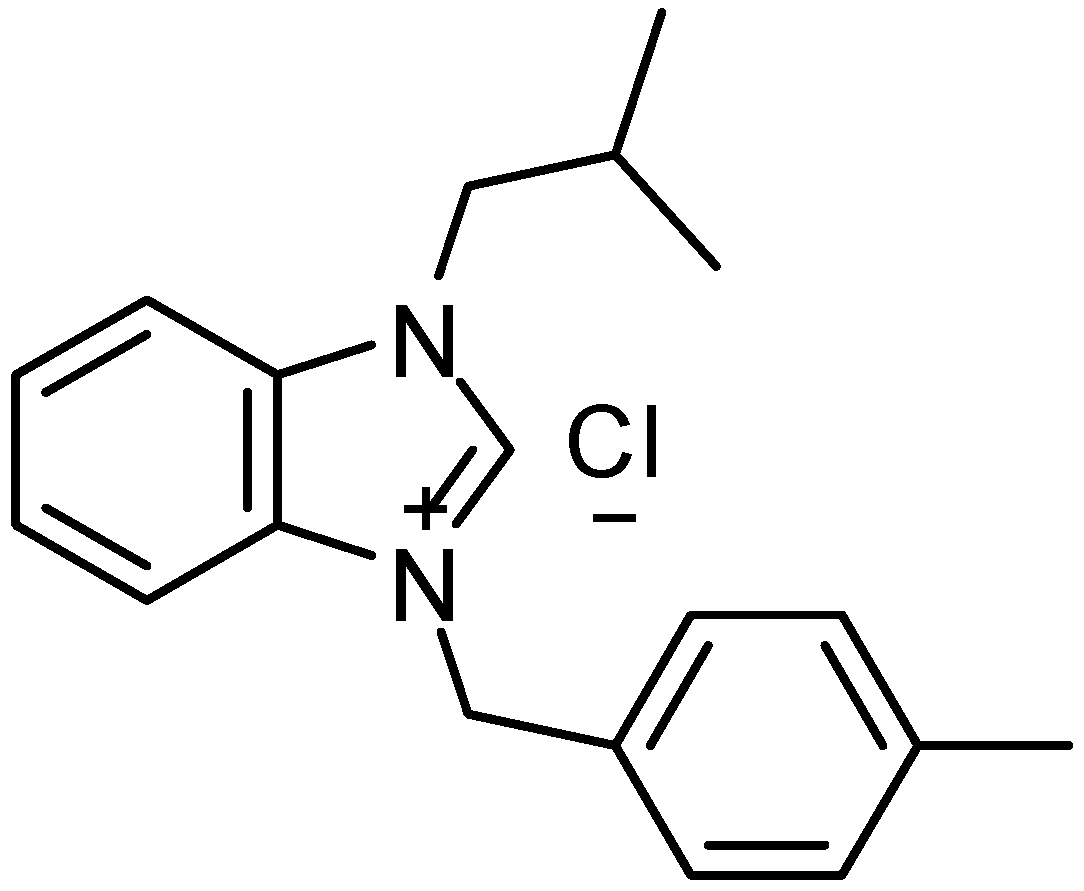
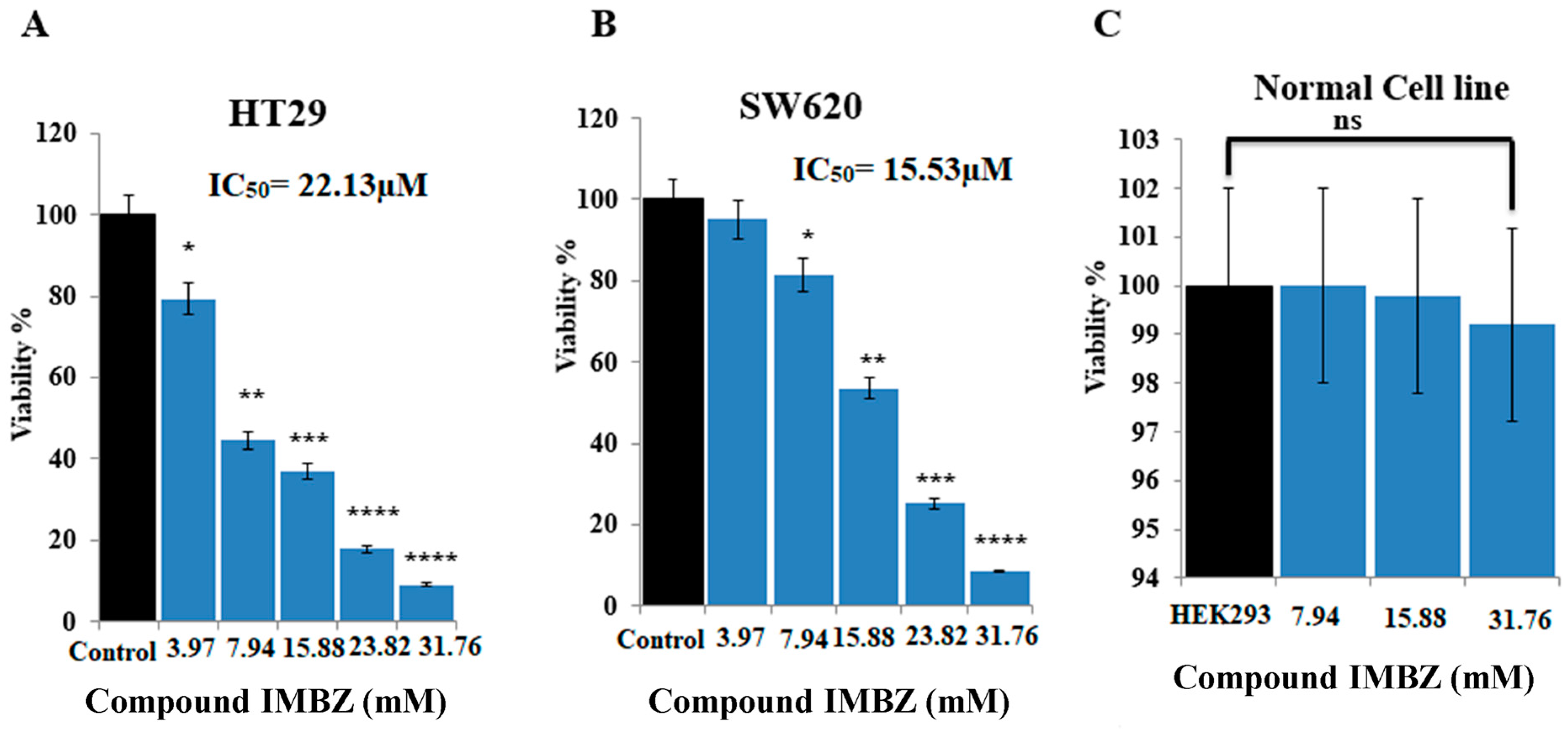

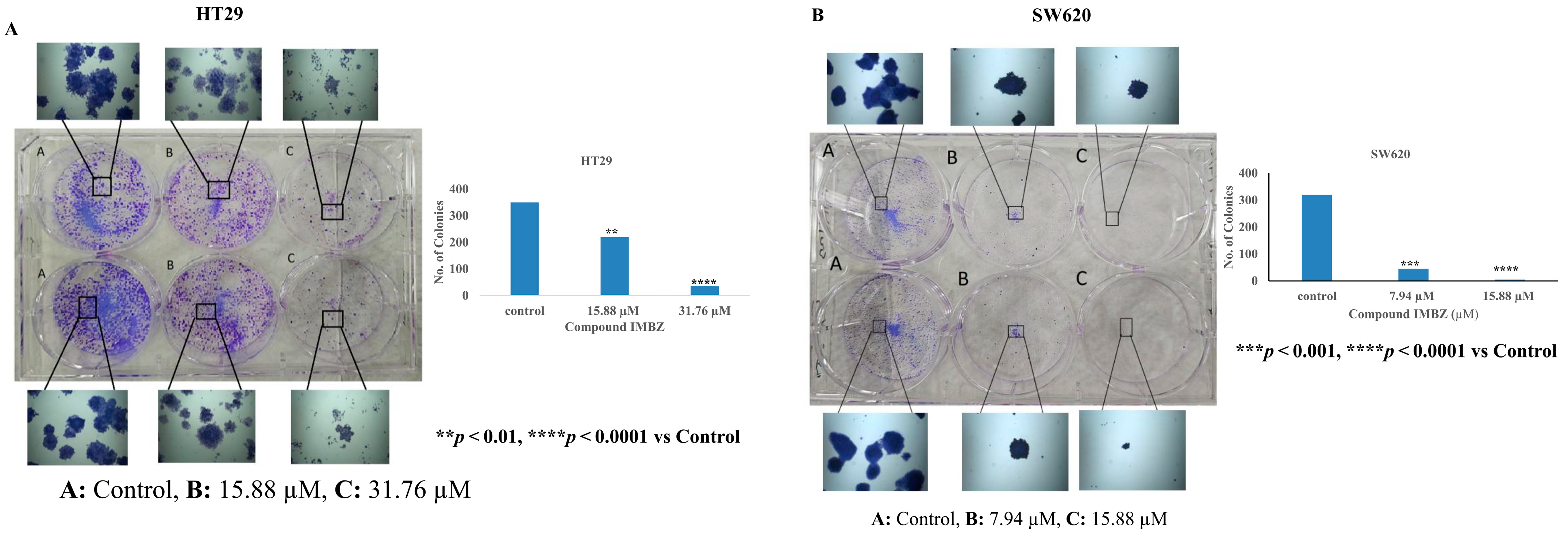
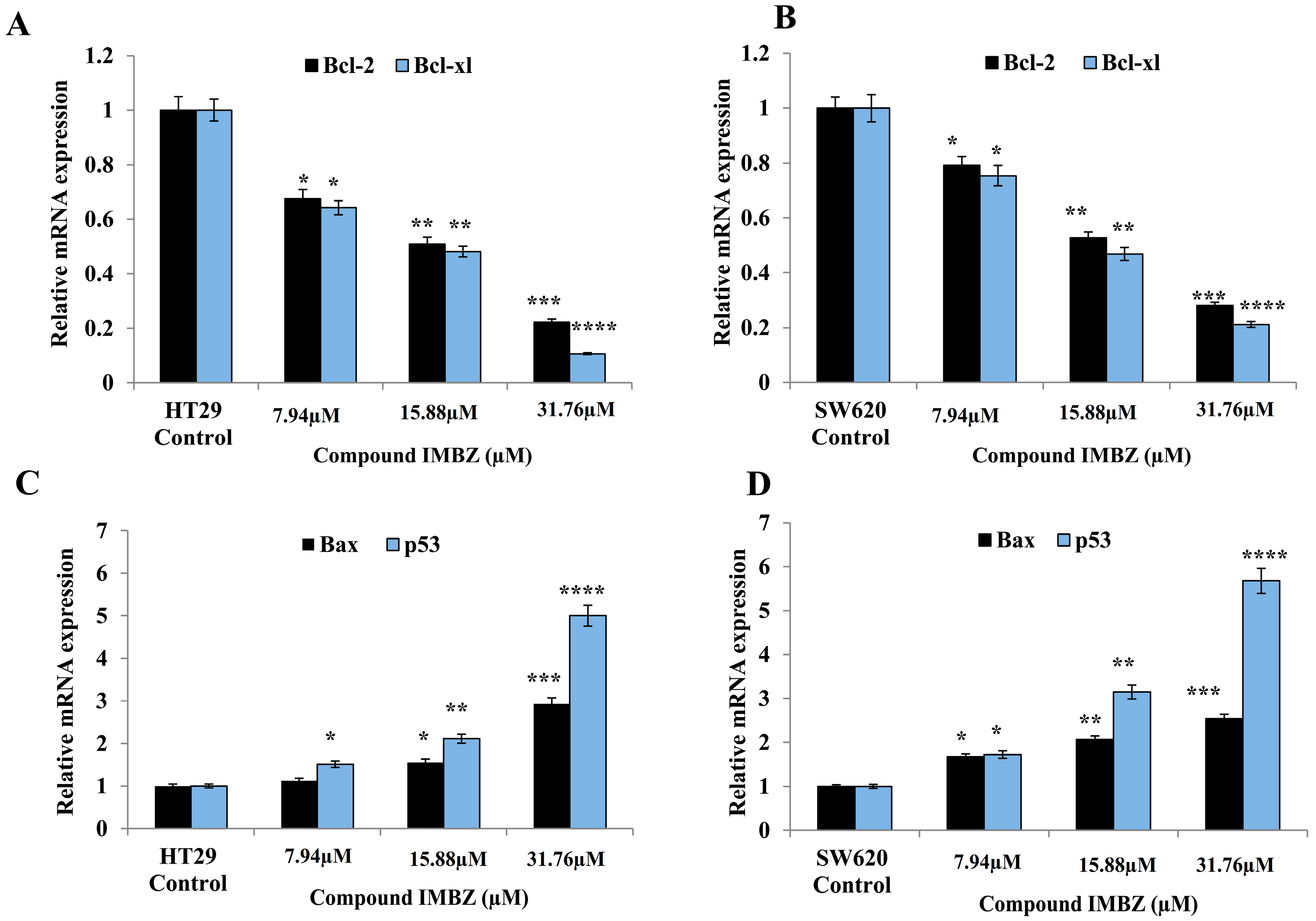
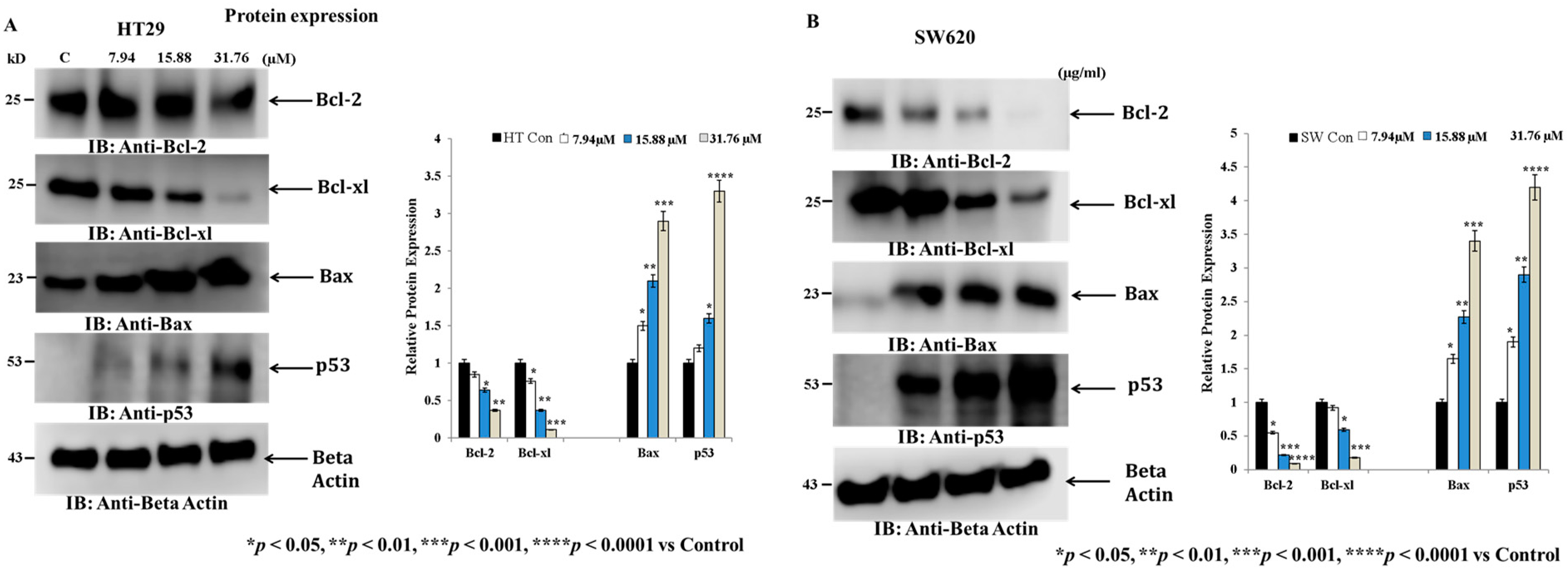
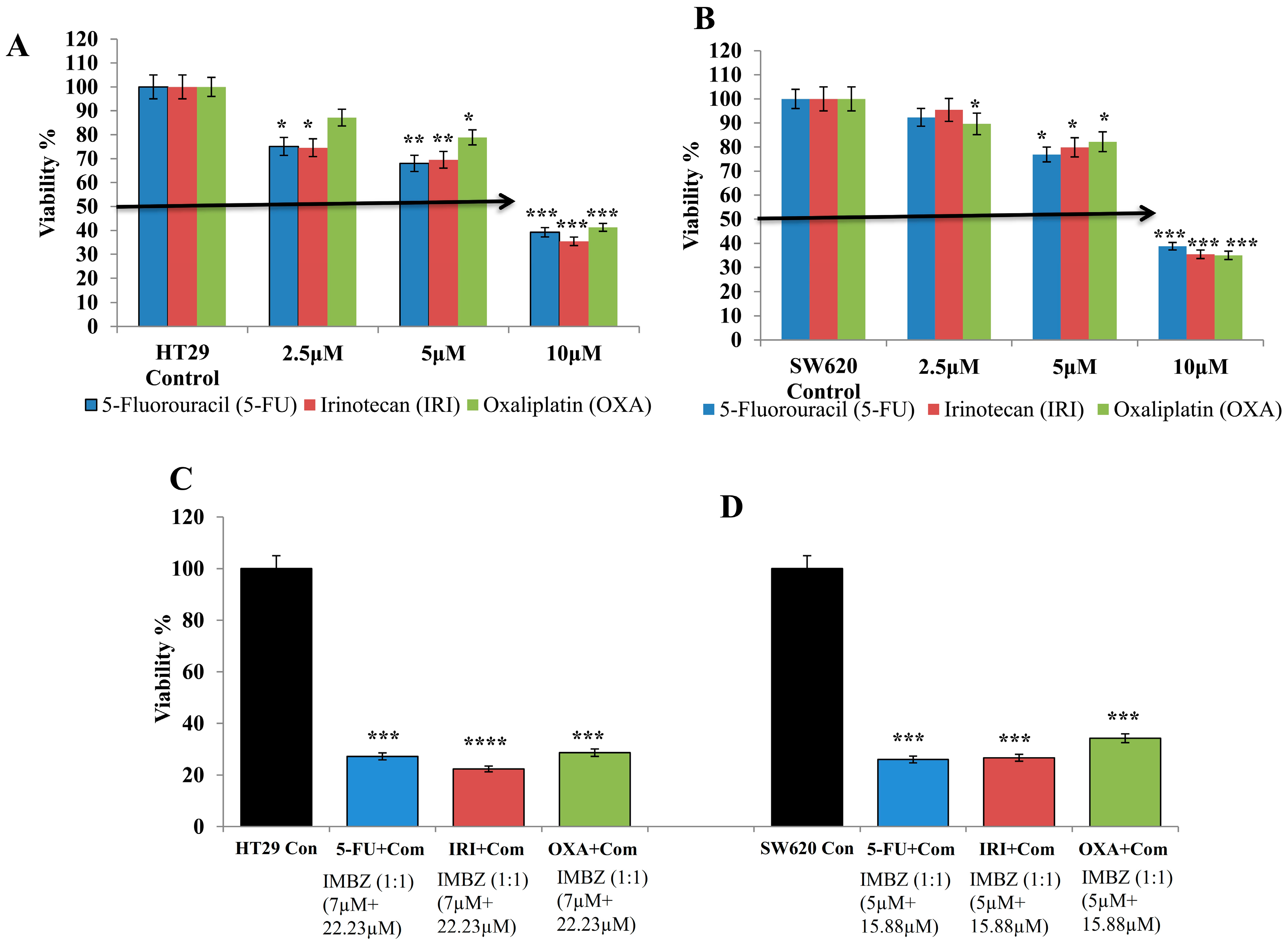
| Target Gene | Primer Sequence 5′→3′ |
|---|---|
| GAPDH | GTCTCCTCTGACTTCAACAGCG (forward) |
| ACCACCCTGTTGCTGTAGCCAA (reverse) | |
| BAX | CCCGAGAGGTCTTTTTCCGAG (forward) |
| CCAGCCCATGATGGTTCTGAT (reverse) | |
| BCL2 | TCCGCATCAGGAAGGCTAGA (forward) |
| AGGACCAGGCCTCCAAGCT (reverse) | |
| BCL-xL | AGTTCCCTTGGCCTCAGAAT (forward) |
| TCCTTTCTGGGGAAGAGGTT (reverse) | |
| TP53 | CCTCAGCATCTTATCCGAGTGG (forward) |
| TGAGGCTCACGTCCATCTCGTC (reverse) |
Disclaimer/Publisher’s Note: The statements, opinions and data contained in all publications are solely those of the individual author(s) and contributor(s) and not of MDPI and/or the editor(s). MDPI and/or the editor(s) disclaim responsibility for any injury to people or property resulting from any ideas, methods, instructions or products referred to in the content. |
© 2024 by the authors. Licensee MDPI, Basel, Switzerland. This article is an open access article distributed under the terms and conditions of the Creative Commons Attribution (CC BY) license (https://creativecommons.org/licenses/by/4.0/).
Share and Cite
Al-Nasser, S.; Abdulla, M.H.; Alhassan, N.; Vaali-Mohammed, M.-A.; Al-Omar, S.; Hamdi, N.; Elnakady, Y.; Matou-Nasri, S.; Mansour, L. A Benzimidazole-Based N-Heterocyclic Carbene Derivative Exhibits Potent Antiproliferative and Apoptotic Effects against Colorectal Cancer. Medicina 2024, 60, 1379. https://doi.org/10.3390/medicina60091379
Al-Nasser S, Abdulla MH, Alhassan N, Vaali-Mohammed M-A, Al-Omar S, Hamdi N, Elnakady Y, Matou-Nasri S, Mansour L. A Benzimidazole-Based N-Heterocyclic Carbene Derivative Exhibits Potent Antiproliferative and Apoptotic Effects against Colorectal Cancer. Medicina. 2024; 60(9):1379. https://doi.org/10.3390/medicina60091379
Chicago/Turabian StyleAl-Nasser, Sarah, Maha Hamadien Abdulla, Noura Alhassan, Mansoor-Ali Vaali-Mohammed, Suliman Al-Omar, Naceur Hamdi, Yasser Elnakady, Sabine Matou-Nasri, and Lamjed Mansour. 2024. "A Benzimidazole-Based N-Heterocyclic Carbene Derivative Exhibits Potent Antiproliferative and Apoptotic Effects against Colorectal Cancer" Medicina 60, no. 9: 1379. https://doi.org/10.3390/medicina60091379
APA StyleAl-Nasser, S., Abdulla, M. H., Alhassan, N., Vaali-Mohammed, M.-A., Al-Omar, S., Hamdi, N., Elnakady, Y., Matou-Nasri, S., & Mansour, L. (2024). A Benzimidazole-Based N-Heterocyclic Carbene Derivative Exhibits Potent Antiproliferative and Apoptotic Effects against Colorectal Cancer. Medicina, 60(9), 1379. https://doi.org/10.3390/medicina60091379








